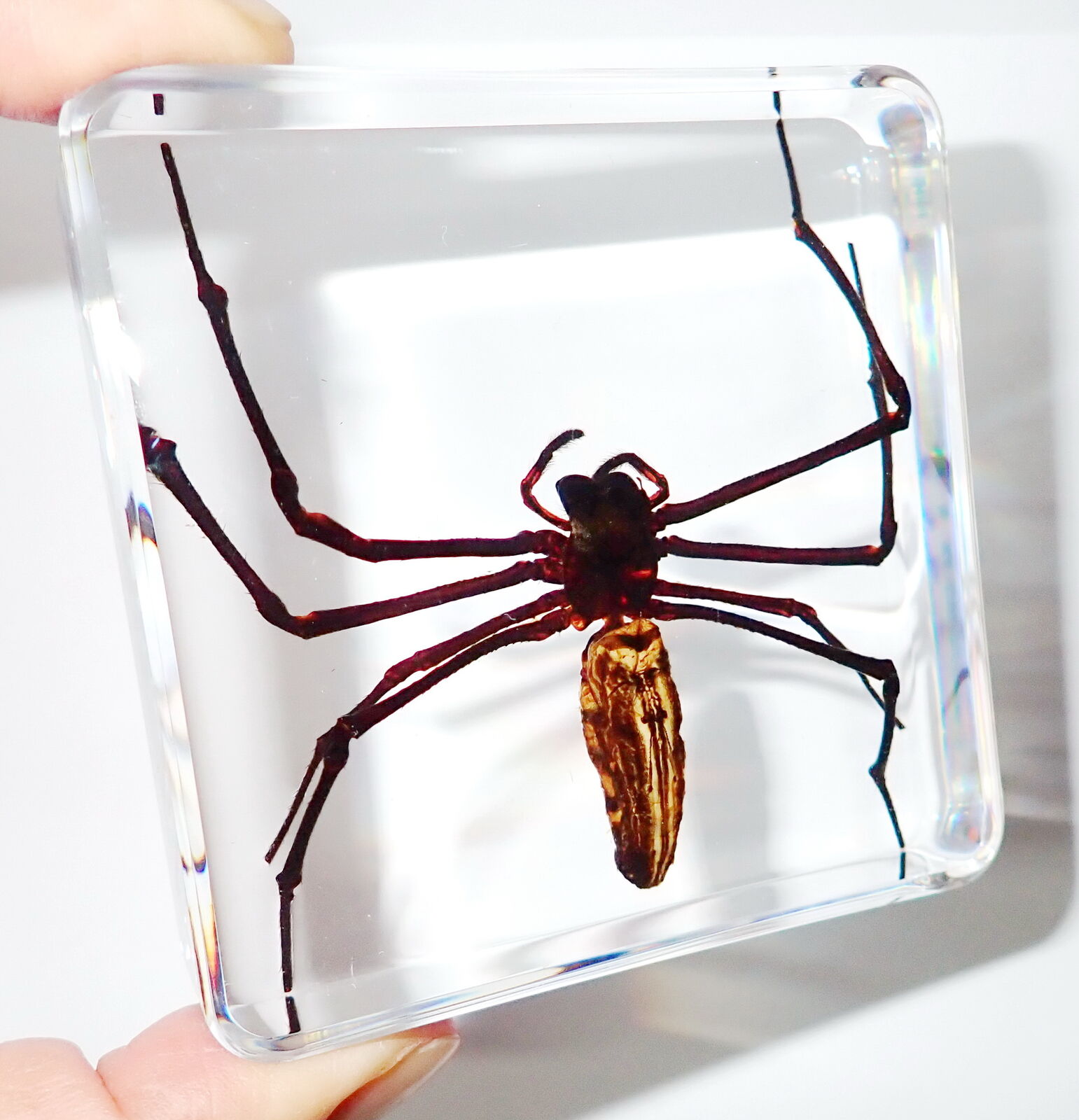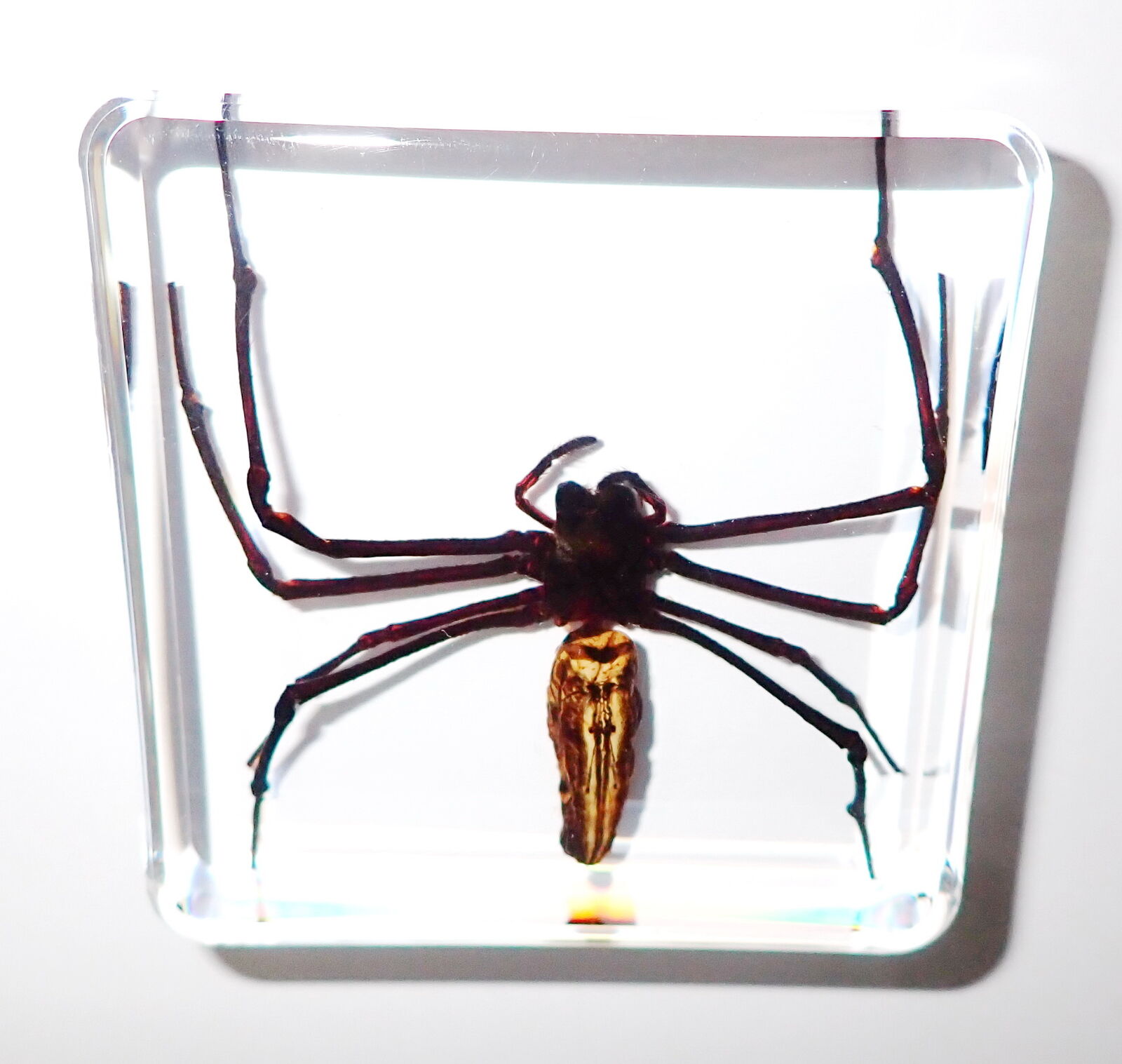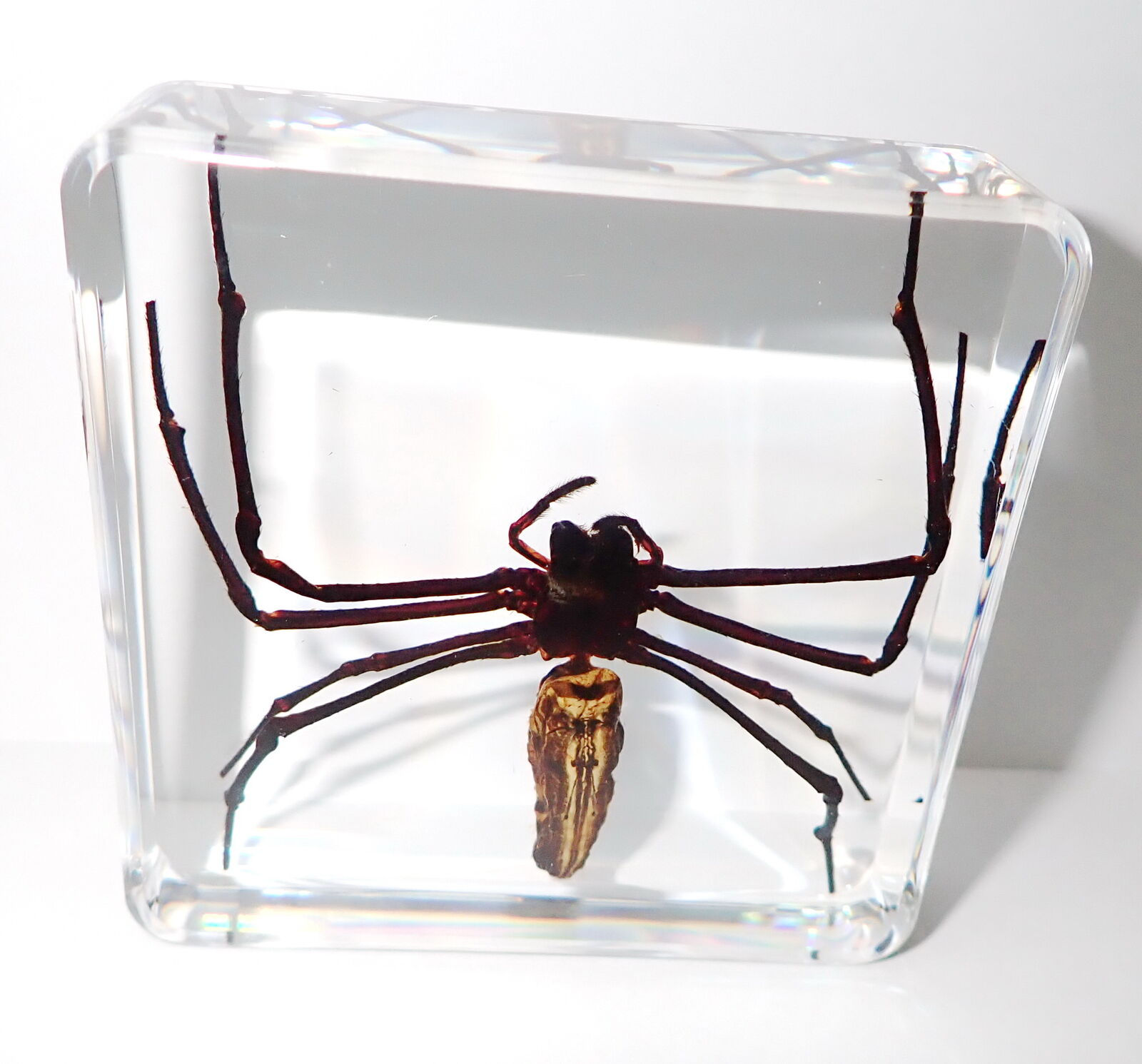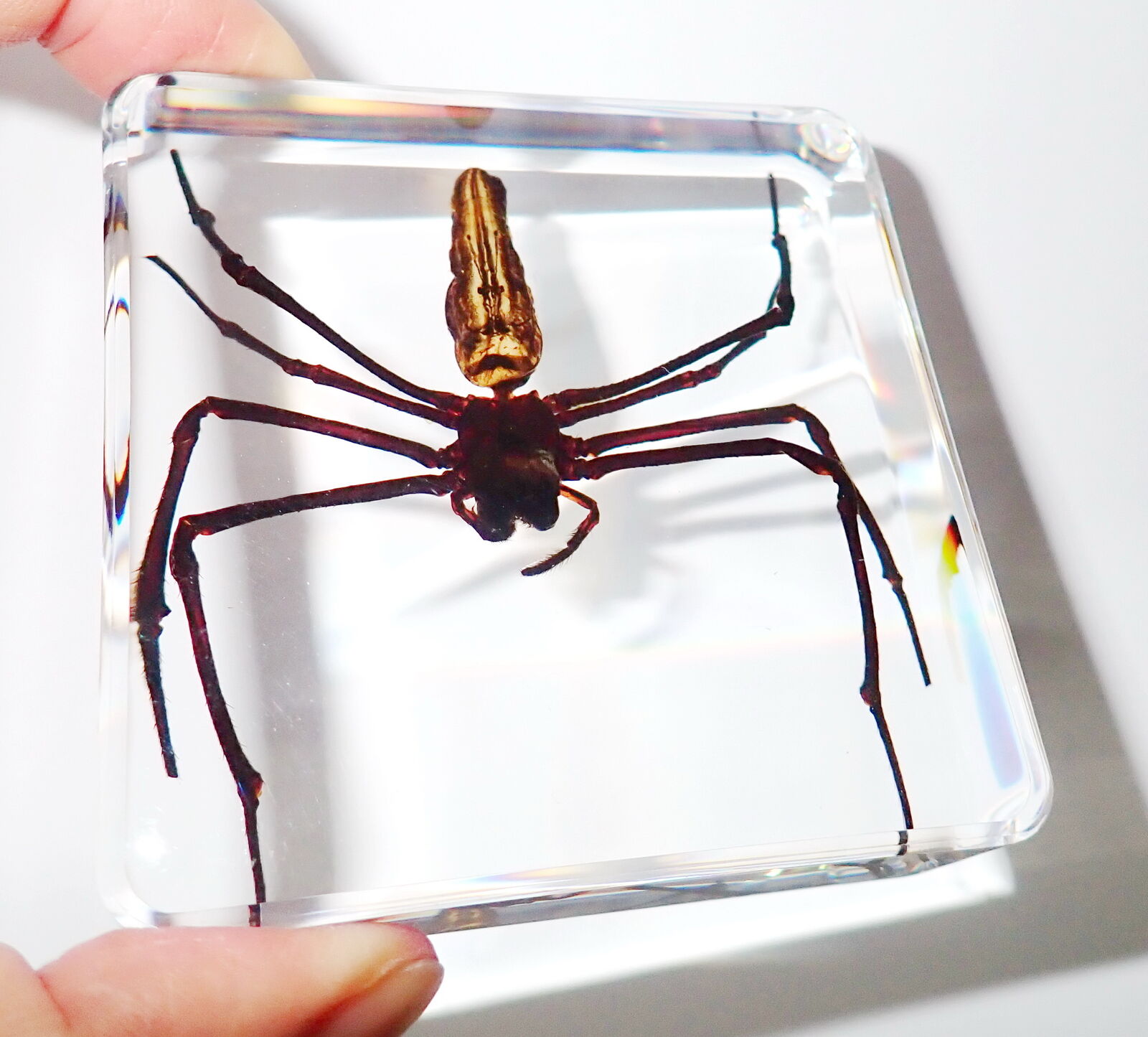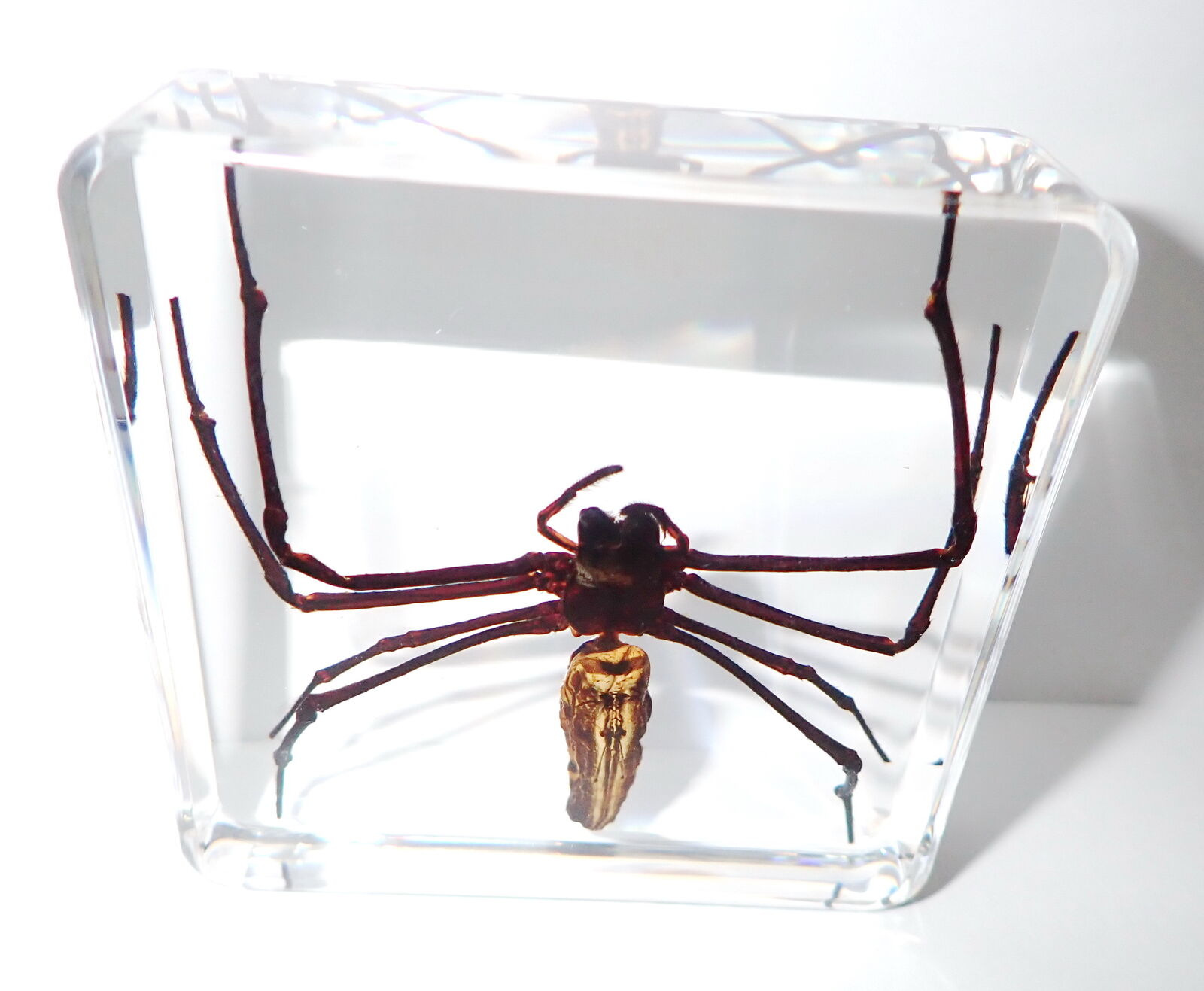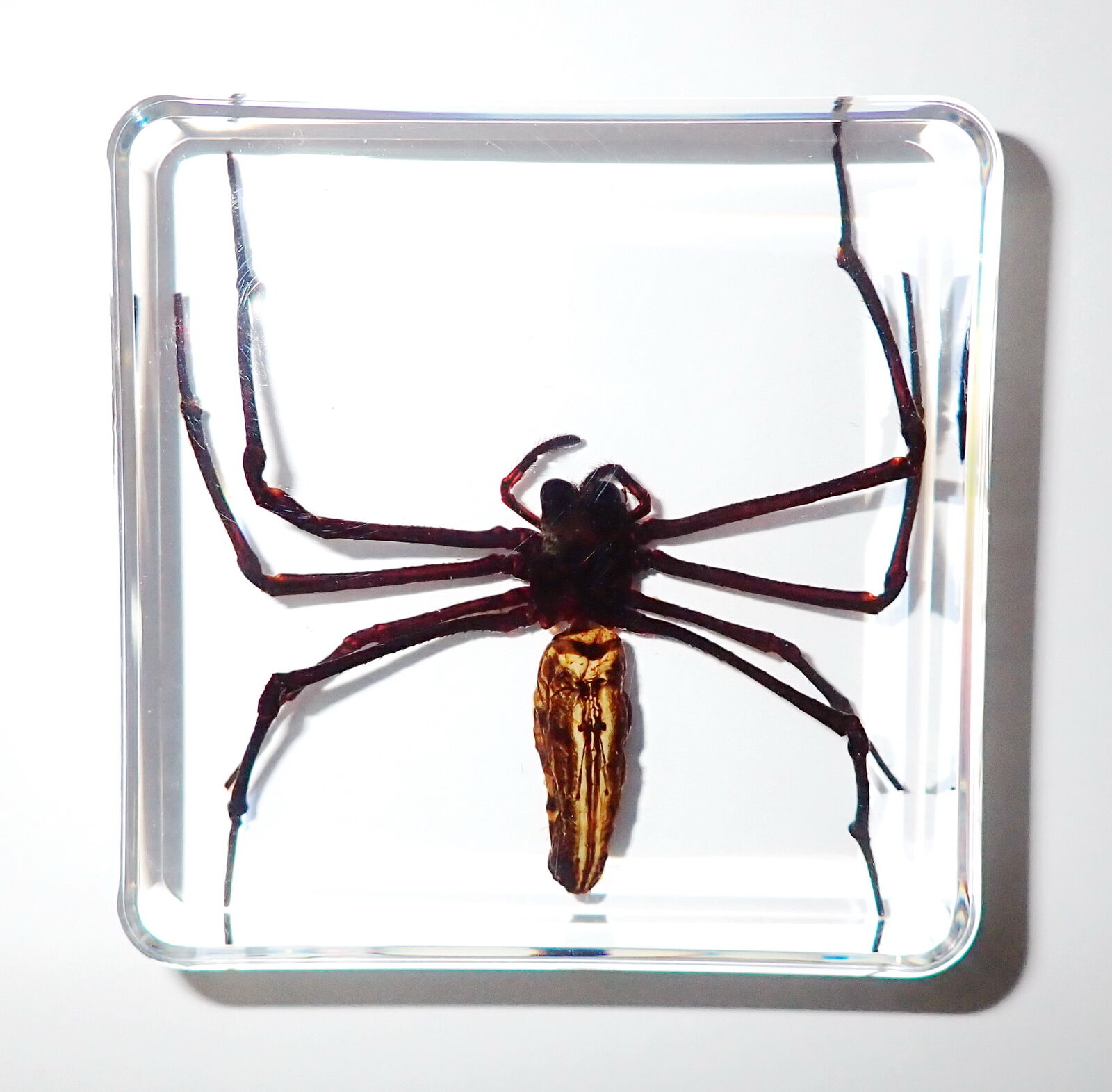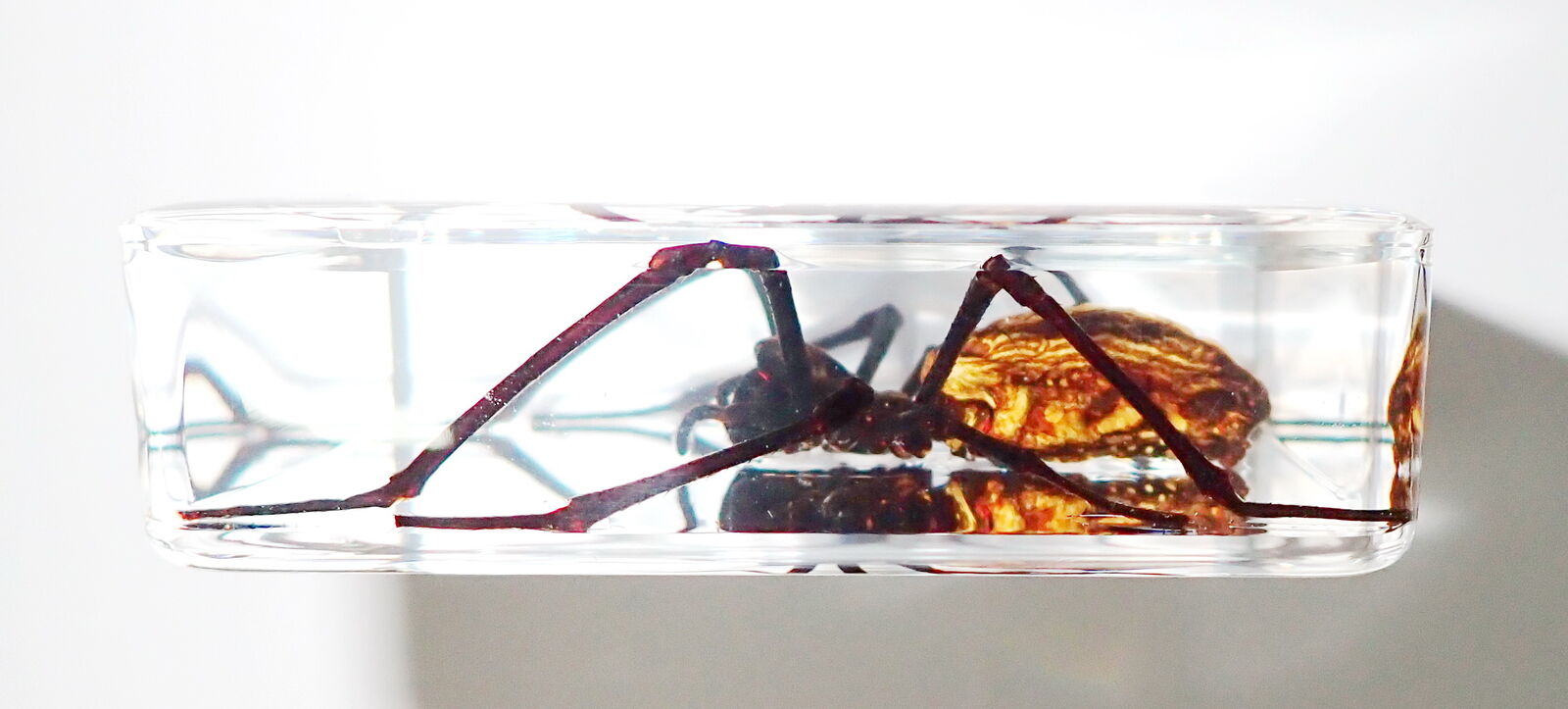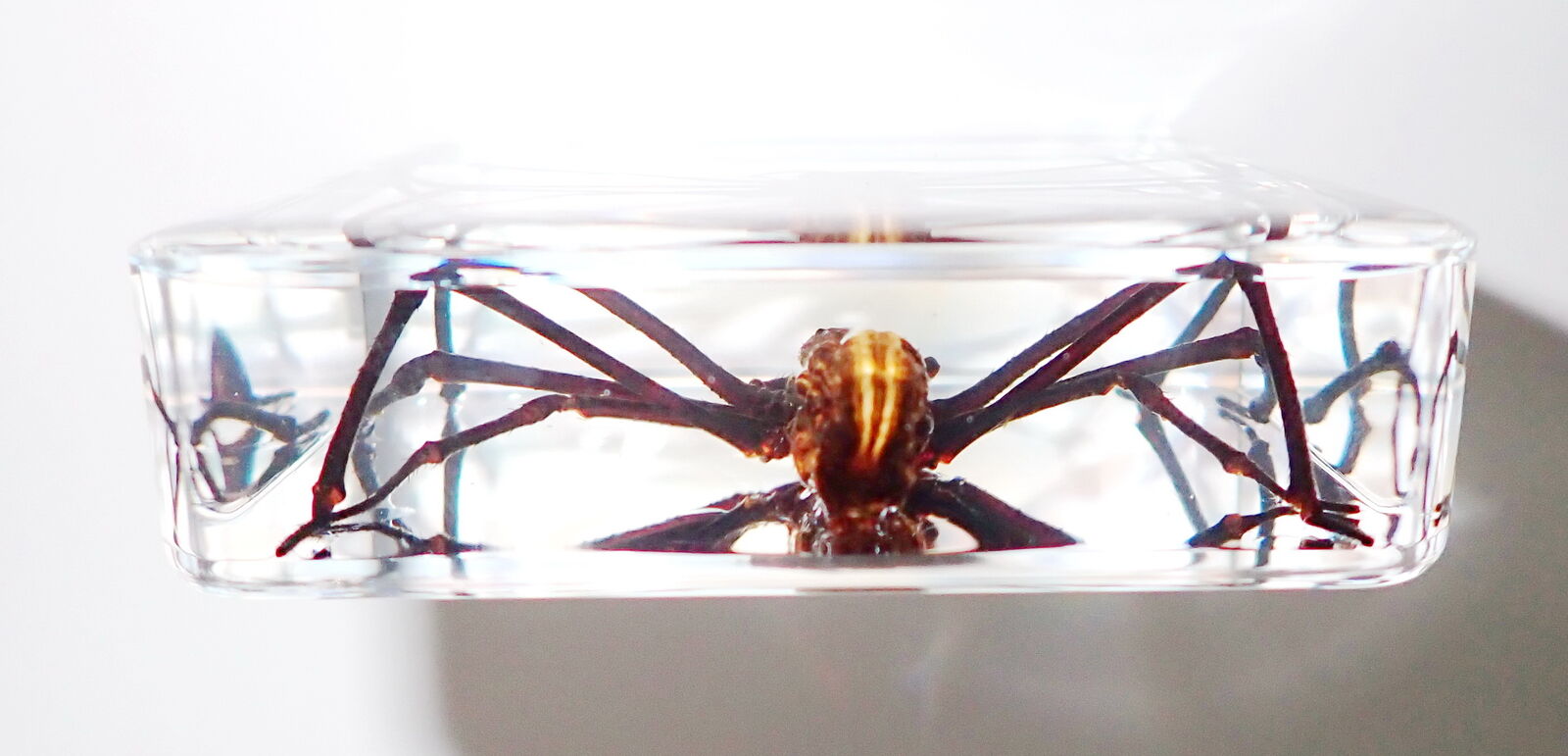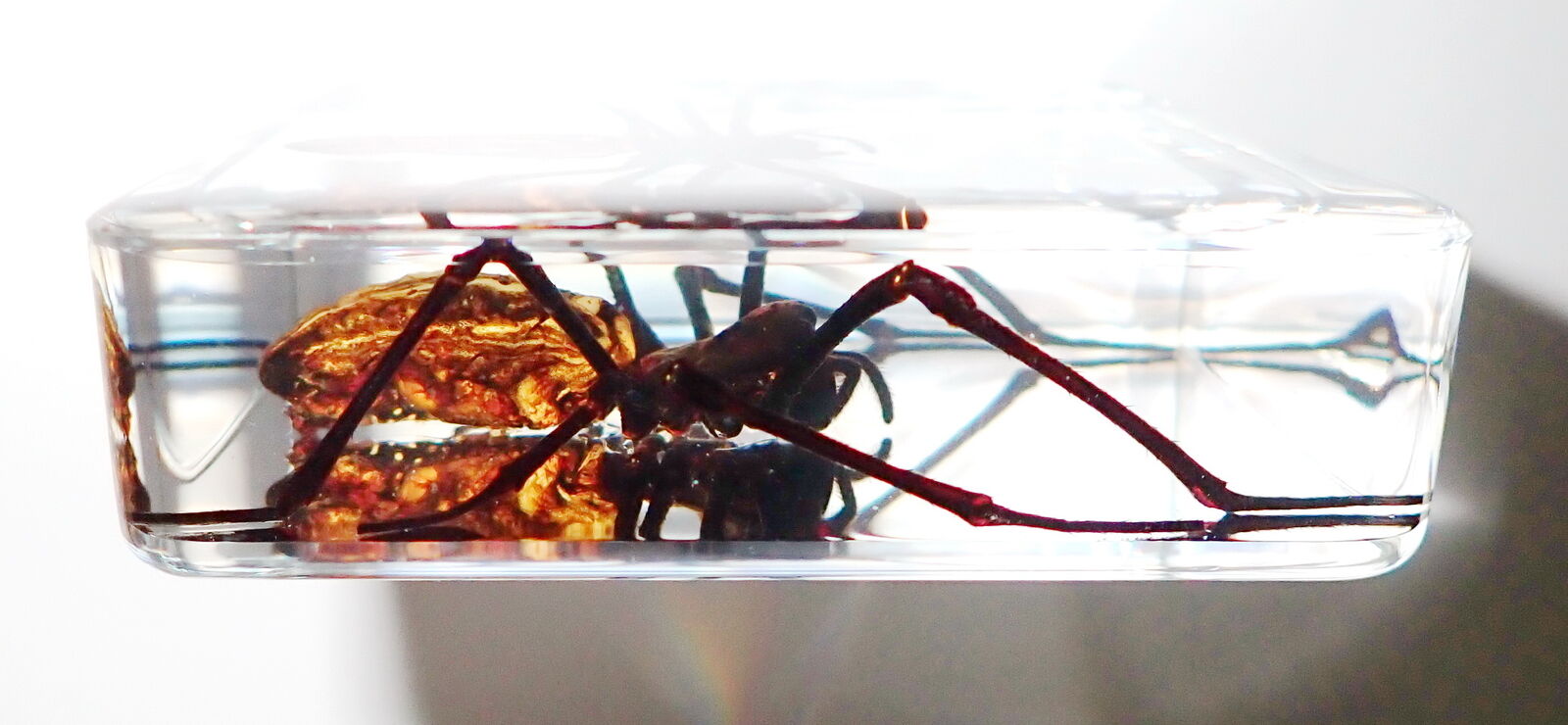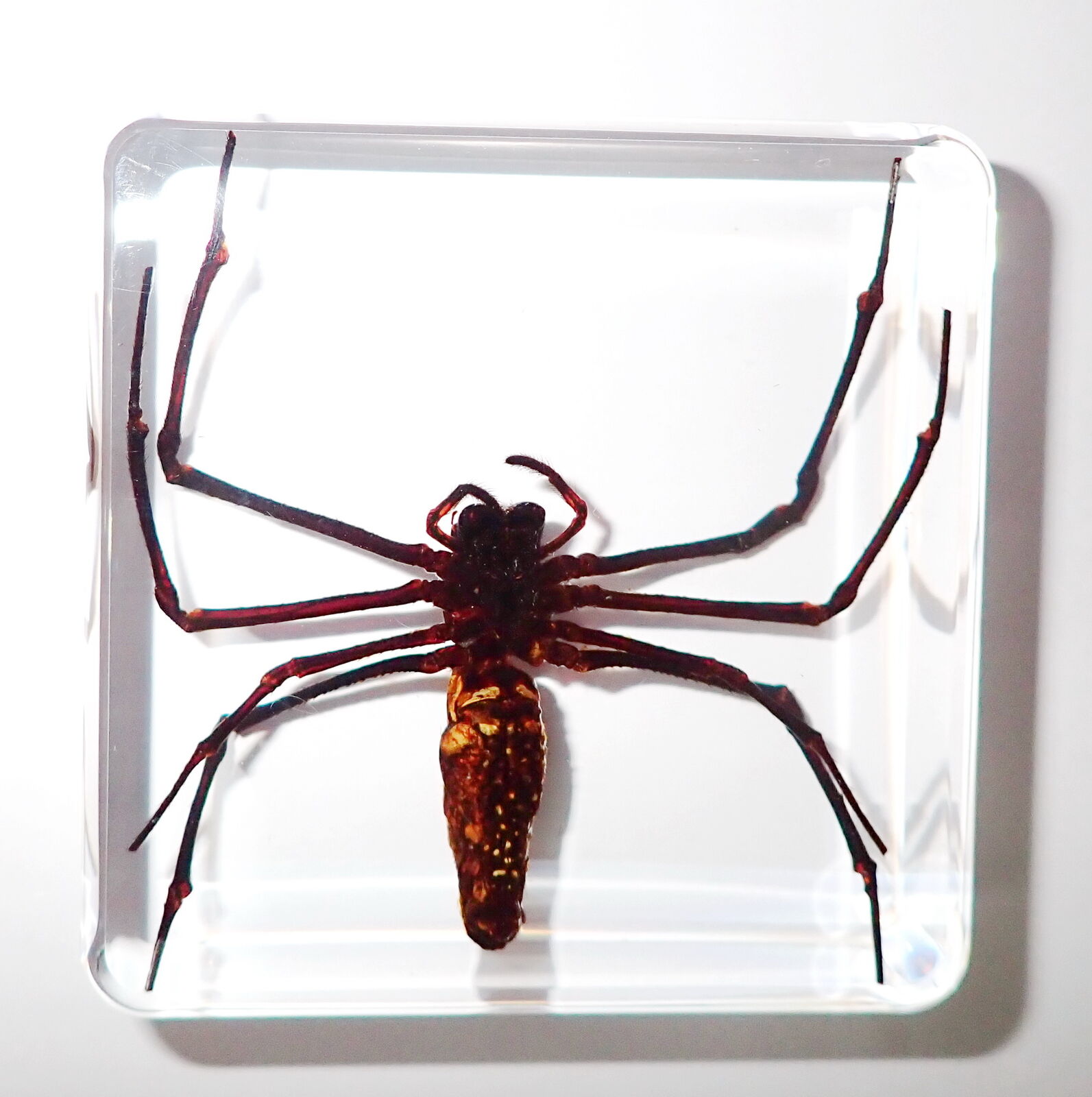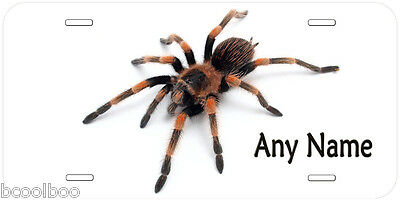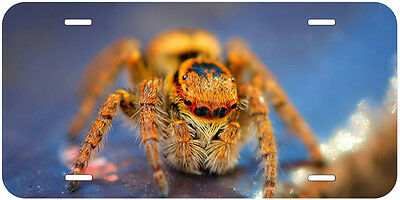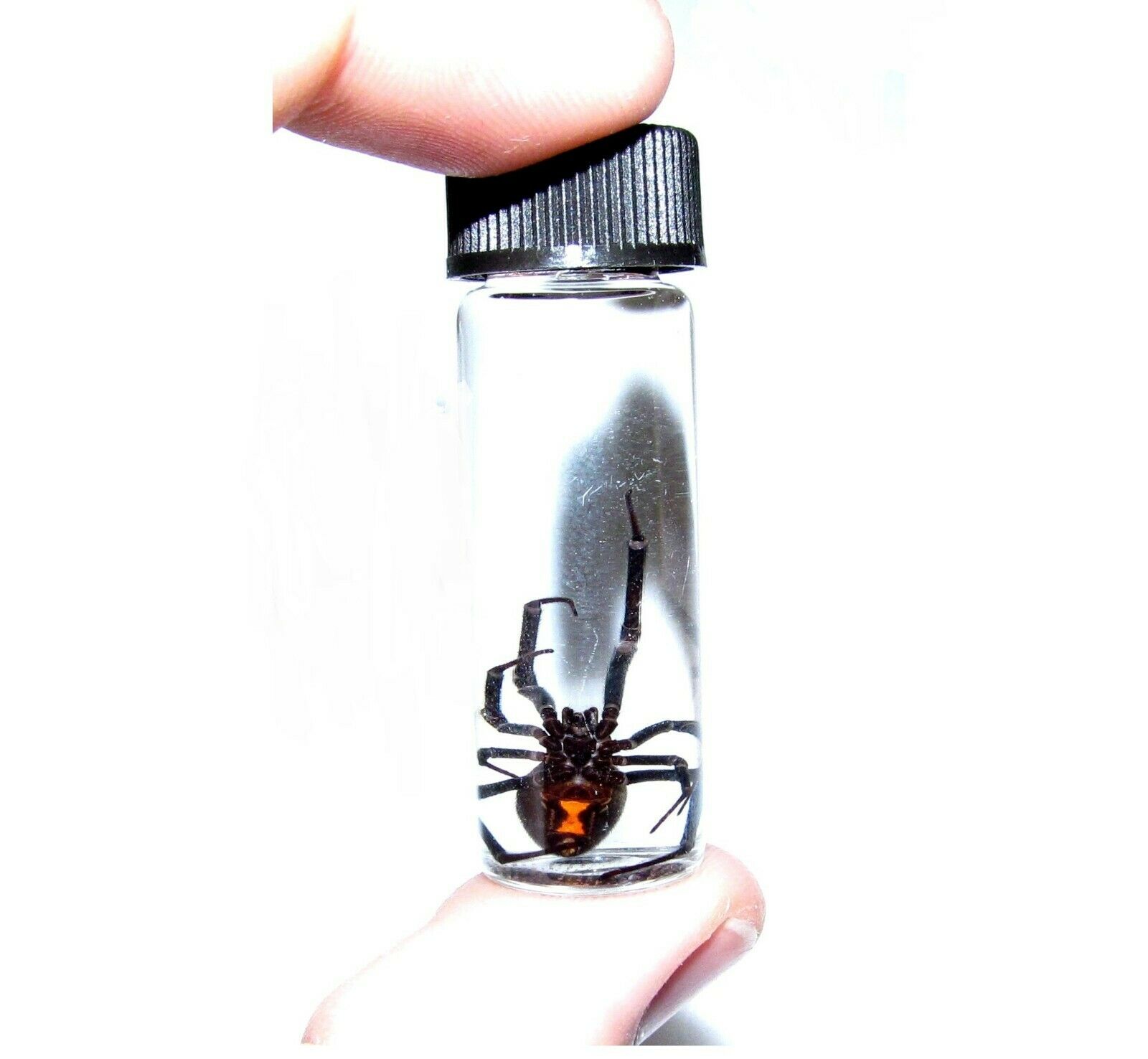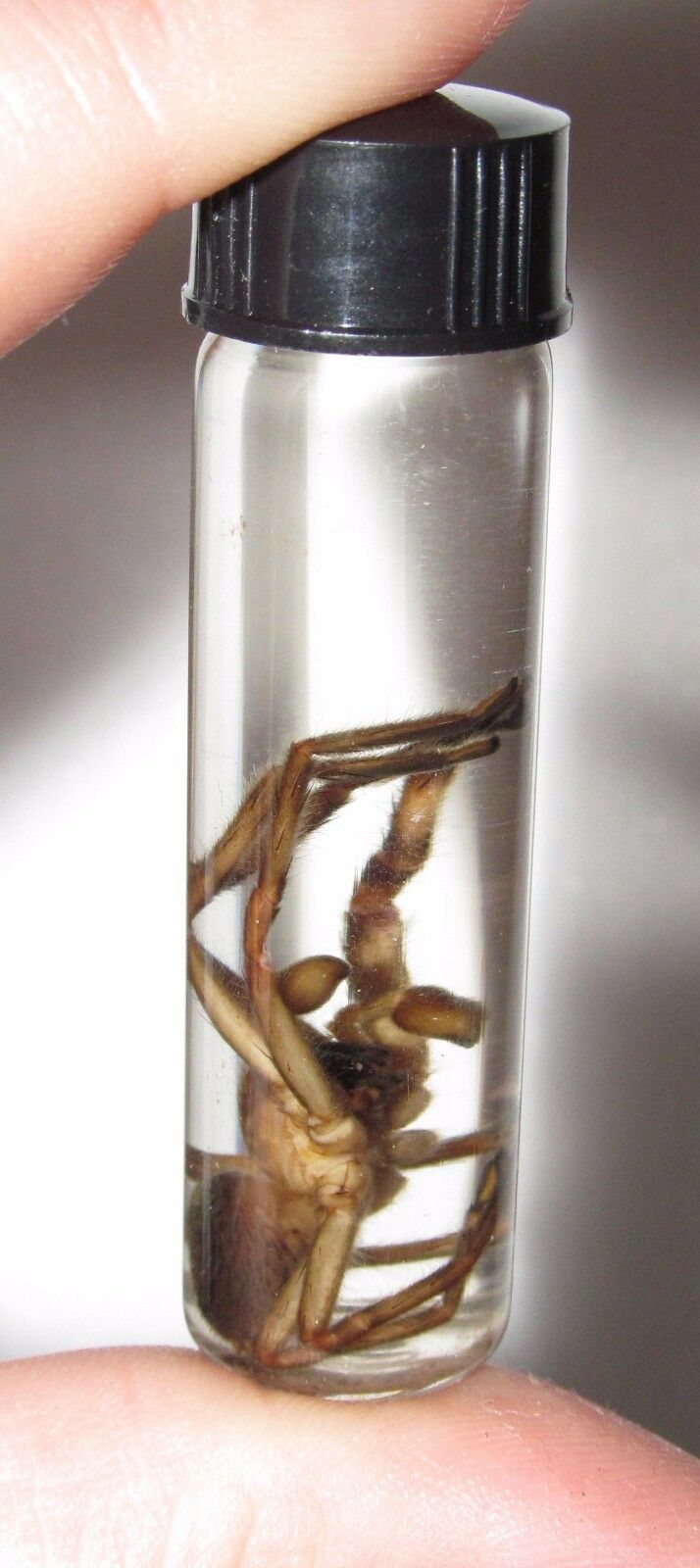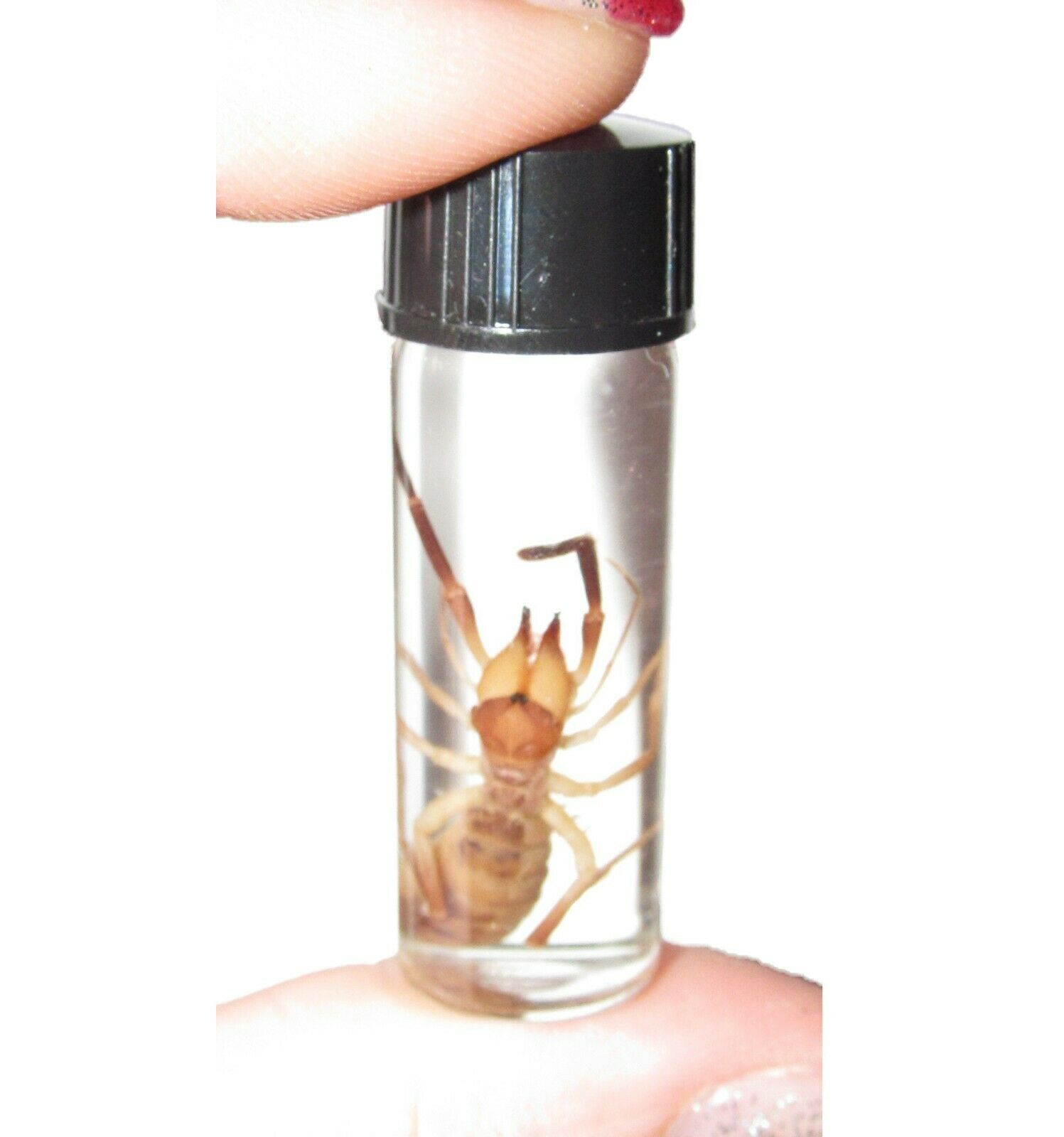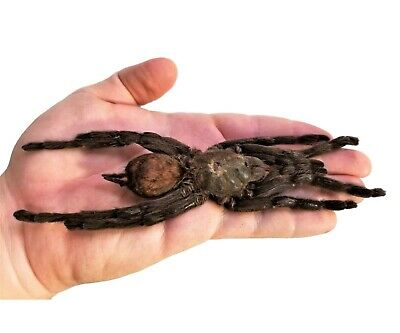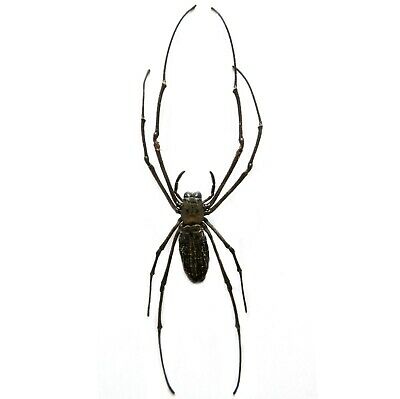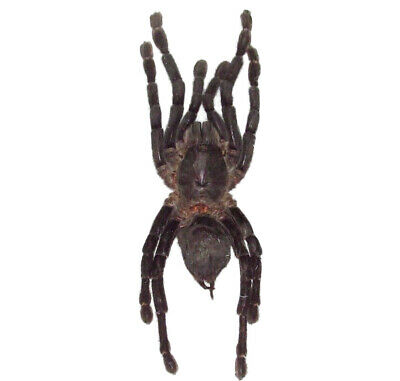-40%
Giant Wood Spider Specimen in 75 mm Square Clear Lucite Block Education Aid
$ 10.56
- Description
- Size Guide
Description
Real Giant Wood Spider - Nephila maculata permanently encased in clear lucite material. The specimen is crystal clear, indestructible and transparent. Safe, authentic and completely unbreakable product put living Spider right at your fingertips!Anyone can safely explore the Spider from every angle.
It is clear enough for microscope observation.
Length of the Spider body is 3 cm (1.2 inch).
Size of the lucite block is 7.5x7.5x2.0 cm (3.0x3.0x0.8 inch).
Weight of the lucite block is 150 g and 200 g with packing box.
Selltotheworld
From all around the world
Giant Wood Spider Specimen in 75 mm Square Clear Lucite Block Education Aid
Real
Giant Wood Spider -
Nephila maculata
permanently encased in clear lucite material. The specimen is crystal clear, indestructible and transparent. Safe, authentic and completely unbreakable product put living Spider right at your fingertips!
Anyone can safely explore the Spider from every angle.
It is clear enough for microscope observation.
Length of the Spider body is 3 cm (1.2 inch).
Size of the lucite block is 7.5x7.5x2.0 cm (3.0x3.0x0.8 inch).
Weight of the lucite block is 150 g and 200 g with packing box.
It is an ideal learning aid for students and kids and also a very good collectible item for every body.
This is a handmade real animal specimen craft. Each one will be a bit different (specimen size, color and posture) even in the same production batch.
The pictures in the listing are just for reference as we are selling multiple pieces with same pictures.
***
Giant W
ood
S
pider
-
Nephila maculata
Common names: Golden Orb Web Spider or
Giant
W
ood
Spider
Main features: Large (female only) shiny legs with red or yellow 'joints', builds large orb webs.
Female: 20cm across from toe to toe, with a body about 3-5cm; males are only one-tenth as big, at 5-6mm.
Status in Singapore: Common in rainforest, secondary vegetation and mangroves
World distribution: Tropical areas from Africa, India, China, Japan across Southeast Asia to Northern Australia and the South Pacific islands.
Classification: Family Araneidae which build orb-webs. Nephila maculata is the largest of its genus.
Webs of steel: The Golden Orb Web Spider is not the largest spider, but makes the largest and strongest web. It gets its name from the golden colour of its silk.
The web can run from the top of a tree 6m high and up to 2m wide. Unlike other spider webs, the Golden Orb Web Spider's web is not dismantled often and can last several years.
Designed to catch large flying insects, the web is slightly angled. It is not a perfect wheel and is usually off-centre. To make its web, the spider releases a thin thread into the wind. When it catches on something, the spider walks along it trailing a stronger non-sticky thread. It repeats the process in the centre of the line to form a strong Y-frame. Around this, it spins the rest of the web out of sticky capture silk.
The silk is so strong that it can trap small birds, which the spider doesn't eat. These trapped creatures often destroy the web by thrashing around. To avoid such damage, the spider often leaves a line of insect husks on its web (like the safety strip across glass doors!); or builds smaller barrier webs around the main web.
Breeding: The male is many times smaller than the female, some are 1,000 smaller! There are suggestions that it is not a case of the males being dwarves, but the females being giants! The male is so tiny that he can live on the female's web, stealing her food, often without her even noticing him. She may not even notice that he has crept up and inseminated her! Nevertheless, just to be sure, he usually does the deed when she is feeding. In some, mating can take up to 15 hours! The female lives only slightly longer than the male.
The female buries her eggs in the ground. First she digs a shallow hole with her strong mandibles and legs, which is then lined with woolly silk. She lays her eggs on this silk, covers it with another woolly layer then covers the whole assembly with camouflaging debris and soil. Laying can take 4 hours. Spiderlings hatch with their eggyolks still attached and don't have fully developed mouthparts, venom glands, digestive tracts or spinning organs. They may stay together at this stage. When they are fully developed, they have to disperse or they will cannibalise each other.
Role in the habitat: Like other predators, the spiders control the population of prey. They are in turn preyed upon by other creatures such as birds. In New Guinea, some tribes consider them a tasty treat. The Golden Orb Web Spider's venom is generally harmless to humans and they rarely bite even if we blunder into and destroy their webs. The bite is just a scratch. They are clumsy on the ground.
Uses by humans: Tribal people have long used the webs of these spiders. In the South Pacific, the web silk is used to make fishing lures, traps and nets. In the Solomon Islands, the spider web is collected by winding it around sticks to make large sticky balls which are suspended just above the water. Needle fish are lured to jump out and get entangled in the ball. In Southeast Asia, people make a net by scooping up the web between a stick bent into a loop. Spider webs have been used as bandage to stop blood flow and used to make bird snares.
In modern times, the Golden Orb Web Spider's silk is set to become a major product. The silk is almost as strong as Kevlar, the strongest man-made material which is drawn from concentrated sulphuric acid. In contrast, spider silk is drawn from water. If we could manufacture spider silk, it would have a million uses from parachutes, bullet-proof vests, lightweight clothing, seatbelts, light but strong ropes, as sutures in operations, artificial tendons and ligaments. Studies are now being done to have genetically engineered plants produce fluid polymers which can be processed into silk! Spiders are not used to produce silk fabric because Silkworm Moth caterpillars produce twice as much silk and are easier to manage (for example, they don't eat each other up!!).
Item Specifics
Modified Item :
No
Country/Region of Manufacture :
China
Handmade :
Yes
Animal Class :
Spider
Material :
Resin
Type :
Collector Plate
Payment
By Paypal
Shipping
Free shipping cost.
We send the goods to USA, Canada, UK, Australia, New Zealand, EU countries and some other European and Asian countries by E-express, a kind of fast postal service by Hong Kong Post. It usually takes about 6 to 10 working days for delivery.
We send the goods to other countries by registered airmail and will take about 8 to 14 working days for delivery.
Returns
Returns: We accept returns with any reason in 30 days.
Contact Us
We will answer buyer messages within 24 hours during working days.
Selltotheworld
From all around the world
DESCRIPTION
PAYMENT
SHIPPING
RETURN POLICY
CONTACT US
Giant Wood Spider Specimen in 75 mm Square Clear Lucite Block Education Aid
Real
Giant Wood Spider -
Nephila maculata
permanently encased in clear lucite material. The specimen is crystal clear, indestructible and transparent. Safe, authentic and completely unbreakable product put living Spider right at your fingertips!
Anyone can safely explore the Spider from every angle.
It is clear enough for microscope observation.
Length of the Spider body is 3 cm (1.2 inch).
Size of the lucite block is 7.5x7.5x2.0 cm (3.0x3.0x0.8 inch).
Weight of the lucite block is 150 g and 200 g with packing box.
It is an ideal learning aid for students and kids and also a very good collectible item for every body.
This is a handmade real animal specimen craft. Each one will be a bit different (specimen size, color and posture) even in the same production batch.
The pictures in the listing are just for reference as we are selling multiple pieces with same pictures.
***
Giant W
ood
S
pider
-
Nephila maculata
Common names: Golden Orb Web Spider or
Giant
W
ood
Spider
Main features: Large (female only) shiny legs with red or yellow 'joints', builds large orb webs.
Female: 20cm across from toe to toe, with a body about 3-5cm; males are only one-tenth as big, at 5-6mm.
Status in Singapore: Common in rainforest, secondary vegetation and mangroves
World distribution: Tropical areas from Africa, India, China, Japan across Southeast Asia to Northern Australia and the South Pacific islands.
Classification: Family Araneidae which build orb-webs. Nephila maculata is the largest of its genus.
Webs of steel: The Golden Orb Web Spider is not the largest spider, but makes the largest and strongest web. It gets its name from the golden colour of its silk.
The web can run from the top of a tree 6m high and up to 2m wide. Unlike other spider webs, the Golden Orb Web Spider's web is not dismantled often and can last several years.
Designed to catch large flying insects, the web is slightly angled. It is not a perfect wheel and is usually off-centre. To make its web, the spider releases a thin thread into the wind. When it catches on something, the spider walks along it trailing a stronger non-sticky thread. It repeats the process in the centre of the line to form a strong Y-frame. Around this, it spins the rest of the web out of sticky capture silk.
The silk is so strong that it can trap small birds, which the spider doesn't eat. These trapped creatures often destroy the web by thrashing around. To avoid such damage, the spider often leaves a line of insect husks on its web (like the safety strip across glass doors!); or builds smaller barrier webs around the main web.
Breeding: The male is many times smaller than the female, some are 1,000 smaller! There are suggestions that it is not a case of the males being dwarves, but the females being giants! The male is so tiny that he can live on the female's web, stealing her food, often without her even noticing him. She may not even notice that he has crept up and inseminated her! Nevertheless, just to be sure, he usually does the deed when she is feeding. In some, mating can take up to 15 hours! The female lives only slightly longer than the male.
The female buries her eggs in the ground. First she digs a shallow hole with her strong mandibles and legs, which is then lined with woolly silk. She lays her eggs on this silk, covers it with another woolly layer then covers the whole assembly with camouflaging debris and soil. Laying can take 4 hours. Spiderlings hatch with their eggyolks still attached and don't have fully developed mouthparts, venom glands, digestive tracts or spinning organs. They may stay together at this stage. When they are fully developed, they have to disperse or they will cannibalise each other.
Role in the habitat: Like other predators, the spiders control the population of prey. They are in turn preyed upon by other creatures such as birds. In New Guinea, some tribes consider them a tasty treat. The Golden Orb Web Spider's venom is generally harmless to humans and they rarely bite even if we blunder into and destroy their webs. The bite is just a scratch. They are clumsy on the ground.
Uses by humans: Tribal people have long used the webs of these spiders. In the South Pacific, the web silk is used to make fishing lures, traps and nets. In the Solomon Islands, the spider web is collected by winding it around sticks to make large sticky balls which are suspended just above the water. Needle fish are lured to jump out and get entangled in the ball. In Southeast Asia, people make a net by scooping up the web between a stick bent into a loop. Spider webs have been used as bandage to stop blood flow and used to make bird snares.
In modern times, the Golden Orb Web Spider's silk is set to become a major product. The silk is almost as strong as Kevlar, the strongest man-made material which is drawn from concentrated sulphuric acid. In contrast, spider silk is drawn from water. If we could manufacture spider silk, it would have a million uses from parachutes, bullet-proof vests, lightweight clothing, seatbelts, light but strong ropes, as sutures in operations, artificial tendons and ligaments. Studies are now being done to have genetically engineered plants produce fluid polymers which can be processed into silk! Spiders are not used to produce silk fabric because Silkworm Moth caterpillars produce twice as much silk and are easier to manage (for example, they don't eat each other up!!).
Item Specifics
Modified Item :
No
Country/Region of Manufacture :
China
Handmade :
Yes
Animal Class :
Spider
Material :
Resin
Type :
Collector Plate
Payment
By Paypal
Shipping
Free shipping cost.
We send the goods to USA, Canada, UK, Australia, New Zealand, EU countries and some other European and Asian countries by E-express, a kind of fast postal service by Hong Kong Post. It usually takes about 6 to 10 working days for delivery.
We send the goods to other countries by registered airmail and will take about 8 to 14 working days for delivery.
Returns
Returns: We accept returns with any reason in 30 days.
Contact Us
We will answer buyer messages within 24 hours during working days.
All right reserved.
Shop Category
Store Home
Fossils
◈ Insects
◈ Plants
◈ Trilobite
◈ Sea animals
Tektite
◈ Loose lots
◈ Single stone
◈ Silver wired pendant
◈ Tiktite hanger
Lapis Lazuli
▷ Polished stones
♢ Loose lots
♢ Single stones
▷ Rough stones
♢ Loose lots
♢ Single stone
◈ Craft items
Turquoise
◈ Natural turquoise
◈ Turquoise substitutes
Stone carving
Rough Stone & mineral
◈ Single piece
◈ Loose lots
Polished Stone & mineral
◈ Single piece
◈ Loose lots
Rough ruby & sapphire
◈ Ruby
◈ Sapphire
Star Ruby & Sapphire
◈ Star Ruby - Opaque
◈ Star Ruby - Transparent
◈ Blue Star Sapphire
◈ Star Sapphire - other colors
Animal specimen items
◈ Life cycle
◈ Collection set
◈ Key ring
◈ Bracelet or bangle
◈ Necklace or pendant
◈ Magnet
◈ Ring
◈ Hanger
◈ Cabochon
◈ Sphere, ball
◈ Laminated specimen
◈ Computer mouse
◈ Stapler
◈ Pen
◈ Bottle Opener
◈ Dome paperweight
◈ Earring
◈ Skeleton
◈ Fish
▷ Single specimens
♢ Spider
♢ Scorpion
♢ Beetle
♢ Marine animal
♢ Bug
♢ Bee, wasp, hornet
♢ Other insects
♢ Bat
♢ Other animal
▷ Butterfly
♢ Butterfly paperweight
♢ Laminated butterfly
Plant specimen
◈ Flower
◈ Leaf
◈ Life Cycle
◈ Collection Set
◈ Laminated items
◈ Seed or root
Stone, mineral, fossil box set
Jewelry crafts
Paper cuts
◈ Small set
◈ Large set
Other
Hot Item
Chinese Water Snake Skeleton in 110x45x18 mm Block Education Animal Specimen
USD 24.00
10 Mohs Scale Stone Set clear plastic box Learning Real Specimen Kit
USD 18.00
Spotted Lanternfly Cicada Life Cycle Simplified Set Real Specimen Learning Aid
USD 15.00
Black Indochinite Tektite Stone 10 pieces Plastic Box Set Natural Specimen Kit
USD 16.00
Insect Cabochon Golden Scorpion Oval 18x25 mm on black bottom 5 pieces Lot
USD 17.00
Picture
New List Item
Wasp & Blue Bottle Fly Specimen Clear Microscope Slide Education Insect Specimen
USD 11.99
Laminated Common Evening Brown Butterfly Specimen in 11x11 cm sheet
USD 9.99
Laminated The Shan Nawab Butterfly Specimen in 11x11 cm sheet
USD 9.99
Blue Star Sapphire Square 8x8 MM Cabochon 6 Rayed Lab-created Opaque 1 pc Lot
USD 14.99
11 Plant Leaf Specimen Set in 11 Amber Clear Lucite Block Education Kit BK2S11A
USD 59.99
Custom Item
